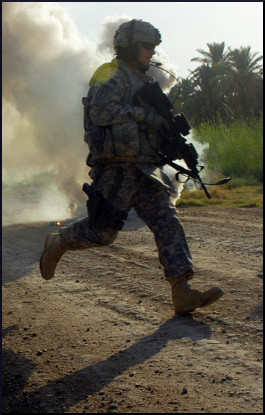
Post-Traumatic Stress Disorder (PTSD) often results from or is associated with traumatic brain injury. Among people experiencing homelessness, head injuries are common, sometimes inflicted in childhood by abusive relatives. Many people who currently experience homelessness also struggle with PTSD, and often express their pain in self-destructive or anti-social ways. A large number of military veterans are homeless, and many of them have brain damage and/or PTSD, either diagnosed or unrecognized.
Two recent House the Homeless posts reviewed Jeremy Schwartz’s shocking story of the VA’s investment in a mobile magnetic resonance imaging scanner that was guaranteed to produce remarkable knowledge and help veterans. It was promised that the big, expensive MRI device would take pictures of brains, and the research was supposed to help heal traumatic brain injuries. This, in turn, was supposed to eventually alleviate PTSD (and indirectly, homelessness) among veterans. As we have seen, it never happened. Here is more information about the fate from which the mobile MRI was supposed to save American military personnel.
Invisible Scars
For the New Statesman, investigative journalist Willard Foxton described the aftermath of his combat reporting assignment, a full-blown case of PTSD, a condition which has been called “battle fatigue,” “combat neurosis,” “operational exhaustion” and many other terms. He still attends support groups and describes such challenges as the social awkwardness of having to say, “Please don’t touch me, I have PTSD.” But that is the least of it. He writes,
You live in a world where suddenly you can be pushed into re-experiencing something awful at a moment’s notice…I was a mess…I didn’t want to talk about it. I knew something was very wrong, but I kept putting off doing something about it. I didn’t want to admit to myself I’d gone mad. I was incredibly embarrassed about the fact I’d often wake up my housemates, screaming.
PTSD causes insomnia, and the absence of restful sleep affects concentration, patience, temper, judgment, intelligence, accident-proneness, mood, and memory. Insufficient sleep can contribute to obesity, irregular heartbeat, high blood pressure, diabetes, and stroke. Imagine someone with chronic insomnia trying to sleep in a crowded, noisy shelter or on the street. Now imagine that person trying to hold a job. Even with no additional physical disabilities, sleep deprivation alone can devastate a person’s life.
Another quite vivid account of living with PTSD comes from poet and novelist Robert Graves, who recorded his World War I experience with “shell shock” or “neurasthenia.”
One Man’s Mission
George Taylor of Florida returned from the Vietnam conflict with PTSD and now literally beats the bushes searching for homeless veterans. He brings them the necessities of life along with information about how to apply for VA benefits. He learned that staying busy helping others is therapeutic for him, so much so that he founded an organization, National Veterans Homeless Support, with the motto “Rescuing Veterans Lost in America.” It has sponsored 16 Stand Down events and opened 5 transitional housing units that can hold up to 18 veterans for periods as long as 2 years. Please visit the NVHS site to learn what help is needed.
How do ordinary citizens feel about all this? Consider this excerpt is from an essay by Richard Aberdeen, owner of Freedom Tracks Records:
Regardless of religious, political or other persuasion, there is no excuse for citizens of the United States to allow even one veteran to be homeless…Do Americans who ignore the plight of homeless veterans really support the troops? Can we march in parades, waving flags and pretending to be patriotic, while we continue to ignore our growing homeless population – even when we know that the causes of homelessness can strike almost anyone at any time, no matter their strength of character?
Reactions?
Source: “The scars you don’t see: what it’s like to live with PTSD,” NewStatesman.com, May 2, 2013
Source: “10 Things to Hate About Sleep Loss,” WebMD.com, undated
Source: “This Veteran Literally Searches Through Shrubbery for Homeless Soldiers
Needing Assistance,” NationSwell.com, October 16, 2014
Source: “Article: Why Are There Homeless Veterans in America? | OpEdNews,” OpEdNews.com, December 13, 2013
Image by DVIDSHUB
